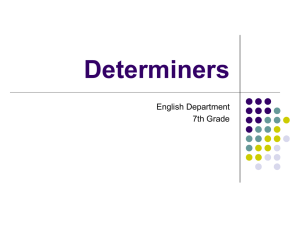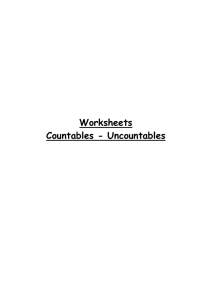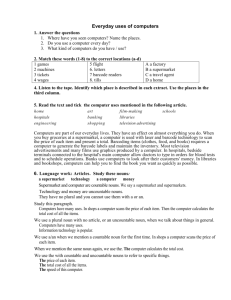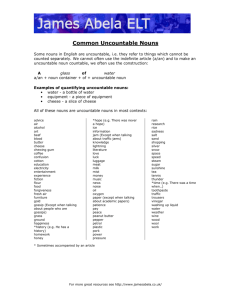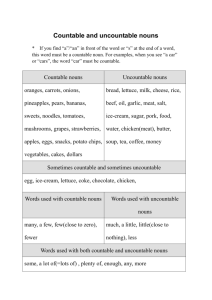here
advertisement
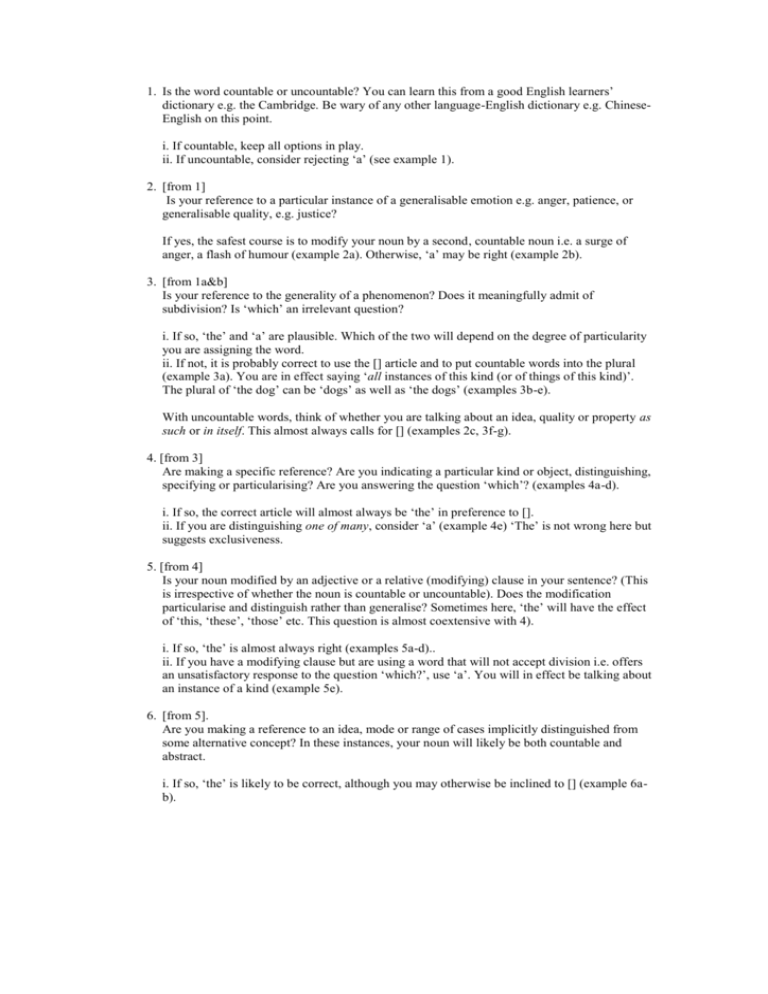
1. Is the word countable or uncountable? You can learn this from a good English learners’ dictionary e.g. the Cambridge. Be wary of any other language-English dictionary e.g. ChineseEnglish on this point. i. If countable, keep all options in play. ii. If uncountable, consider rejecting ‘a’ (see example 1). 2. [from 1] Is your reference to a particular instance of a generalisable emotion e.g. anger, patience, or generalisable quality, e.g. justice? If yes, the safest course is to modify your noun by a second, countable noun i.e. a surge of anger, a flash of humour (example 2a). Otherwise, ‘a’ may be right (example 2b). 3. [from 1a&b] Is your reference to the generality of a phenomenon? Does it meaningfully admit of subdivision? Is ‘which’ an irrelevant question? i. If so, ‘the’ and ‘a’ are plausible. Which of the two will depend on the degree of particularity you are assigning the word. ii. If not, it is probably correct to use the [] article and to put countable words into the plural (example 3a). You are in effect saying ‘all instances of this kind (or of things of this kind)’. The plural of ‘the dog’ can be ‘dogs’ as well as ‘the dogs’ (examples 3b-e). With uncountable words, think of whether you are talking about an idea, quality or property as such or in itself. This almost always calls for [] (examples 2c, 3f-g). 4. [from 3] Are making a specific reference? Are you indicating a particular kind or object, distinguishing, specifying or particularising? Are you answering the question ‘which’? (examples 4a-d). i. If so, the correct article will almost always be ‘the’ in preference to []. ii. If you are distinguishing one of many, consider ‘a’ (example 4e) ‘The’ is not wrong here but suggests exclusiveness. 5. [from 4] Is your noun modified by an adjective or a relative (modifying) clause in your sentence? (This is irrespective of whether the noun is countable or uncountable). Does the modification particularise and distinguish rather than generalise? Sometimes here, ‘the’ will have the effect of ‘this, ‘these’, ‘those’ etc. This question is almost coextensive with 4). i. If so, ‘the’ is almost always right (examples 5a-d).. ii. If you have a modifying clause but are using a word that will not accept division i.e. offers an unsatisfactory response to the question ‘which?’, use ‘a’. You will in effect be talking about an instance of a kind (example 5e). 6. [from 5]. Are you making a reference to an idea, mode or range of cases implicitly distinguished from some alternative concept? In these instances, your noun will likely be both countable and abstract. i. If so, ‘the’ is likely to be correct, although you may otherwise be inclined to [] (example 6ab). 1. 1. It was a news that first sparked off my interest in Australia. It was a news item that first sparked off my interest in Australia. 2a. A surge of anger passed through him, but he controlled himself; he did not act on it. 2b. 2b. It is undoubtedly the case that political alliances are sustained by friendship. Possibly the alliance only held together on account of the friendship between the leaders of the two leading factions. 2b. A friendship that stands the test of time so well merits only our admiration. [The first is the general case; the second a specific reference requiring ‘the’; the last is the rarest kind, denoting ‘this particular instance of the general quality’.] BUT 2c. It is undoubtedly the case that political alliances are sustained by the friendship. 2c. It is undoubtedly the case that political alliances are sustained by a friendship. [The last example is not too bad, but needs further modification e.g. below to be acceptable.] 2d. It is undoubtedly the case that certain political alliances have been sustained by a friendship between remarkable men, such as that for instance between Churchill and Roosevelt or, in a domestic context, between Brandt and Adenauer. 3a. Countries refusing to accept trade deals risk seeing a reduction in their foreign aid budgets. 3a. Countries refusing to accept the trade deals risk seeing a reduction in their foreign aid budgets. 3b. The dog is a notably faithful beast. Plural: 3c. Dogs are notably faithful beasts. Not: 3d. The dogs are notably faithful beasts. [The second is not ungrammatical, but it means ‘these dogs in particular’ i.e. ‘other dogs will bite your leg off, but the dogs are notably faithful beasts’. Any English person reading the struck-through sentence would think, ‘which dogs?’ If you have implicitly answered that question, the struck-through type of sentence is probably o.k. If ‘which’ is a bad or an embarrassing question, the uncountable article [] is a better option.] 3e. Systems that proved unstable in the past have been exhaustively tested for the simulation. [i.e. all of them; there is no interest in discriminating between members of this class.] 3f. Sand flew in our eyes, obscuring the low sun on the horizon. 3g. Pride is an emotion which interferes with one’s capacity to make rational decisions. 4a. The light area on our chart designates those parts of the machinery which cooled at a rate of over 4K/min. 4b. The difference between these interpretations lies in the weight that they assign the writer’s intention. 4c. We are now looking at the hippocampus. 4d. The gazelle is a member of the antelope family. 4e. This is a problem that demands careful consideration. [In other words, there are other problems that also demand careful consideration.] 5a. The land which lay to the east of Bombay was uninhabited. 5b. The time to act had come. 5c. But at this stage, it may be said that he acted with the hope that defies experience. NOT 5d. But at this stage, it may be said that he acted with hope that defies experience. [This is not badly wrong, but comes across as confusing and somewhat archaic.] 5e. A caveat over the reliability of these procedures has immediately to be entered. 6a. The problem, I am afraid to say, lies with your methodology. NOT 6a. Problem, I am afraid to say, lies with the methodology. [Always distrust sentences with countable nouns as their subject but no visible article. You are saying ‘the problem’ rather than the ‘interest’ or the ‘advantage’.] 6b. We are surely correct in assigning criminals to the category of deviants. NOT 6b. We are surely correct in assigning criminals to category of deviants. Uncountable: news It was a piece of news that I had been anticipating—and dreading—for weeks. It was a news that first sparked off my interest in Australia. Countable: set We were concerned to generate a set of the issues that mattered to people and to put them on the table. The set of facts with reference to which the Commission seek to prove Blofeld’s guilt is wholly unreliable. We bring set of facts to your attention. Countable: ‘claim’ I would urge a claim for a punitive amount of damages. (Distinguished from phrasal verbs; uncountable: discrimination:) The islanders lay claim to special treatment insofar as they have suffered from discrimination in the past. Ambiguous, given as uncountable: ‘justice’ Justice is more than a matter of observing those laws that happen to be in force. The justice of the decisions remains debatable in those circumstances where evidence has been cast in doubt. A justice meted out by Presidential decree can hardly be satisfactory. The justice is more than a matter of observing the laws that happen to be in force. He said that he was motivated by the justice. A few/few There are few issues which set the pulses racing as much as that of immigration. [i.e. almost no] We did run into a few disagreements, but nothing that couldn’t be resolved by negotiation at the sub-committee stage. [i.e. very few; almost none at all]


